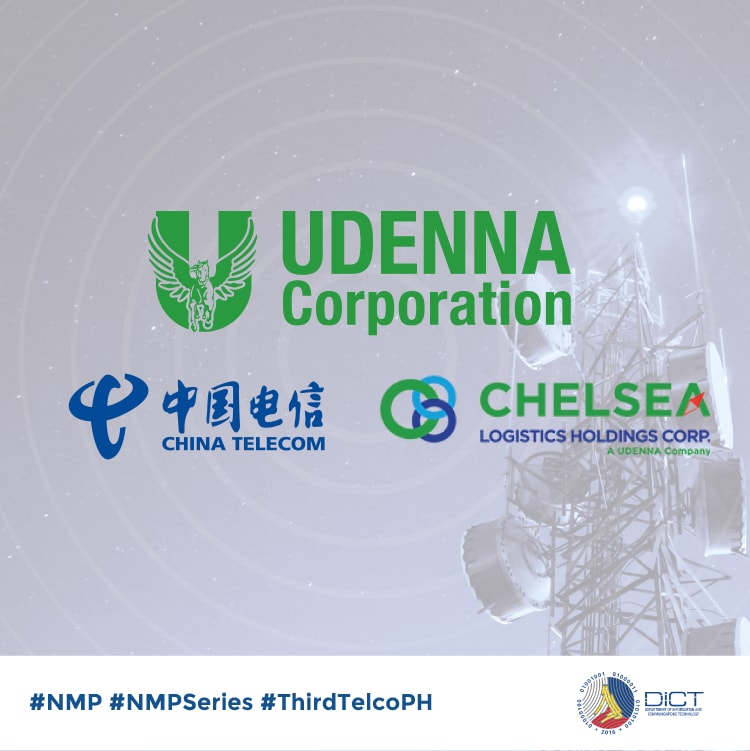Third Telco Race: Not Much Said About the China Connection
Photo from the Department of Information and Communications Technology Facebook page
ON NOVEMBER 7, the National Telecommunications Commission (NTC) declared the Mislatel consortium the provisional new major player (NMP) that will break the duopoly of Globe Telecom and PLDT Inc. over Philippine cell phone and internet services.
The winning consortium is comprised of Udenna Corporation and its subsidiary Chelsea Logistics; the Mindanao Islamic Telephone Company, and China-owned China Telecom.
Media’s coverage focused mostly on the selection process and the legal issues raised by the disqualified contenders. There were no reports on the track record of the NMP and the potential issues that the participation of a foreign firm in the telecommunications industry pose. No story probed the problems that could arise given that China Telecom is owned by China which has been in contentious conflict over its presence in the West Philippine Sea.
CMFR monitored reports from the three leading broadsheets (Manila Bulletin, the Philippine Daily Inquirer and The Philippine Star); primetime newscasts 24 Oras (GMA-7), Aksyon (TV5), News Night (CNN Philippines) and TV Patrol (ABS-CBN 2); as well as selected news websites from November 7 to 15, 2018.
Straightforward
Reports in television and in the newspapers, which were mostly in the business section rather than the front pages, recalled the selection process conducted by the Department of Information and Communications Technology (DICT) and NTC, including the declaration of Mislatel consortium as the provisional third telco player. They made it clear that the winning consortium will still have to go through a verification process before being officially named as the final NMP. Complaints by the losing bidders were also noted, including the legal steps taken by the parties involved.
They also reported the comments of government officials. Presidential Spokesperson Salvador Panelo, during a Palace briefing on November 8, denied that the government had favored the Mislatel consortium due to Duterte’s ties with Davao-based businessman Dennis Uy, owner of Udenna Corporation. Media nevertheless recalled Uy’s connection to the president, noting that he was one of Duterte’s top supporters during the 2016 national elections. In addition to recalling Uy’s ties with Duterte, a GMA News Online report on November 7 also noted the campaign contributions of Uy and at least six officers of the companies that are part of the Mislatel consortium.
Missing Threads
With their emphasis on the procedures of, and the legal challenges to the third telco selection process, the media failed to discuss restrictions on foreign ownership and whether the participation of China Telecom observed Article XII, Sections 10 and 11 of the 1987 Constitution which allows only up to 40 percent of ownership of public utilities.
As early as July 2017, the Duterte administration was already expressing its intent to allow up to 70 percent foreign ownership of public utilities, which include telecommunications. In May this year, DICT Sec. Eliseo Rio revealed that a bill has been filed in Congress to “decategorize” telecommunications from a public utility to a public service, for which there is no foreign ownership limit.
Is the government then still pushing for expanding foreign ownership of public utilities? How much participation will China Telecom be actually allowed? More importantly, how would a higher percentage of foreign ownership in the telecommunications sector affect the country’s national interests? News accounts did not raise these questions and failed to ask the relevant authorities, such as the NTC and the DICT, for clarification.
Media also relegated to sidelines the concerns over national security, as expressed by Senator Grace Poe and House Minority Leader Danilo Suarez, whose views were noted but not discussed.
Media failed to connect the development to the reality of China’s occupation of the West Philippine Sea. Noticeably absent were the views of security experts who could have weighed in on the risks of letting China Telecom into the country.
Moreover, reports did not look into the track record of the said company or of the other two companies making up the consortium, as these are all relatively unknown in the field of telecommunications.
Rappler provided an exception on November 15 with an article in its “Thought Leaders” section.
In addition to discussing some issues in the bidding process and noting businessman Dennis Uy’s close ties to Duterte, the analytical piece by JC Punongbayan zeroed in on the security concerns posed by China Telecom, calling the company’s involvement in the telco bid as “the biggest red flag of all.”
The account pointed out the Chinese government’s history of cyber surveillance, and cited a recent report which showed that China Telecom “has been involved in the misdirection of large amounts of internet traffic to China.” Punongbayan asked: “Given this track record, what could prevent China Telecom from similarly redirecting a sizable chunk of Philippine internet traffic to China?”
Punongbayan also warned consumers of China’s advanced capacity for mass surveillance and pointed out that China Telecom is a company “closely linked to the world’s most advanced surveillance state.”
Punongbayan’s analysis only scratched the surface of the potential issues regarding China Telecom. While it is important to remain vigilant over the selection process, the entry of a new player should be scrutinized in all its aspects – in this case, the security threats posed by the Chinese surveillance state on Philippine interests.
Update: The NTC has officially confirmed the Mislatel consortium as the new third telecommunications player on Monday, November 19.

Leave a Reply